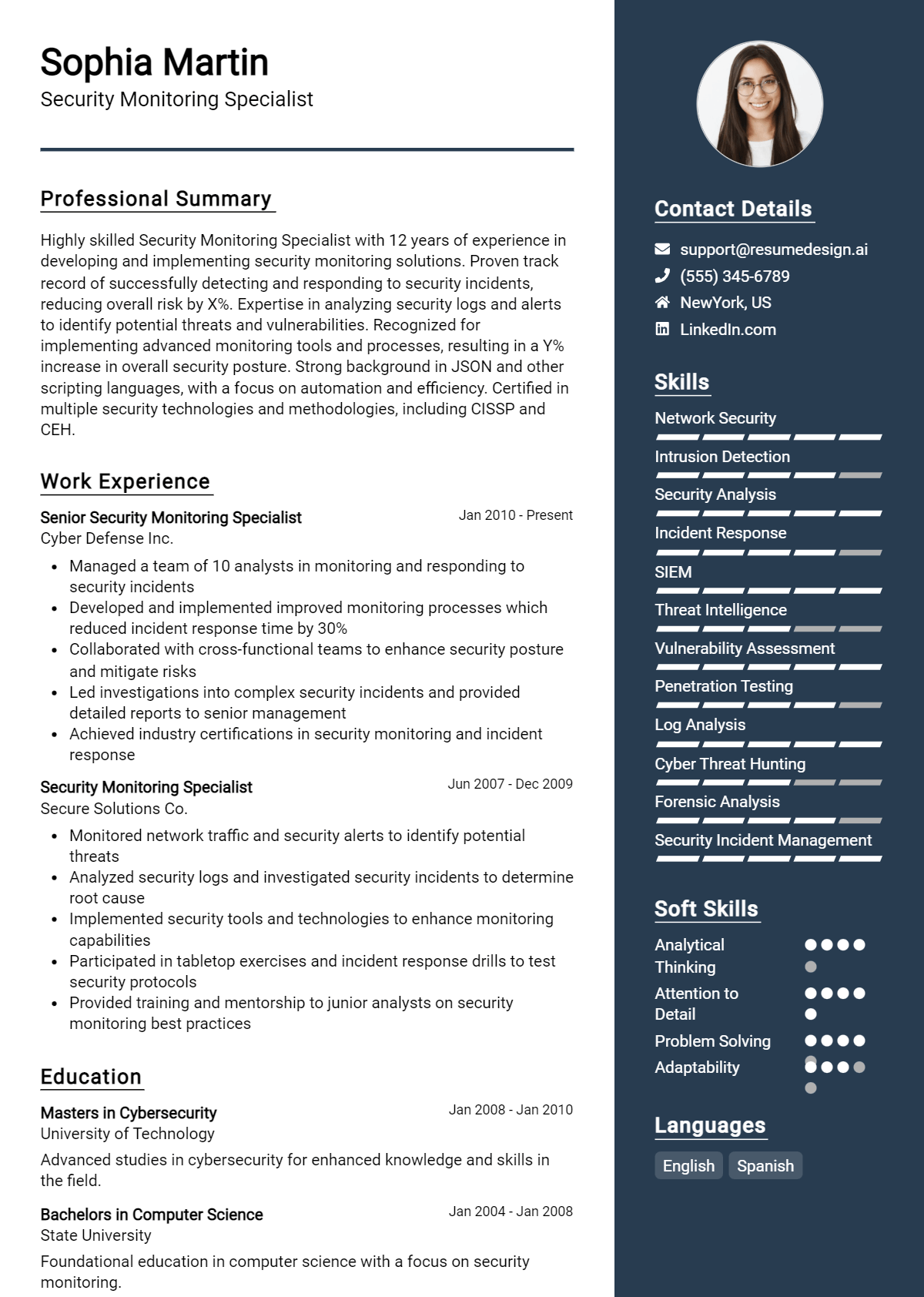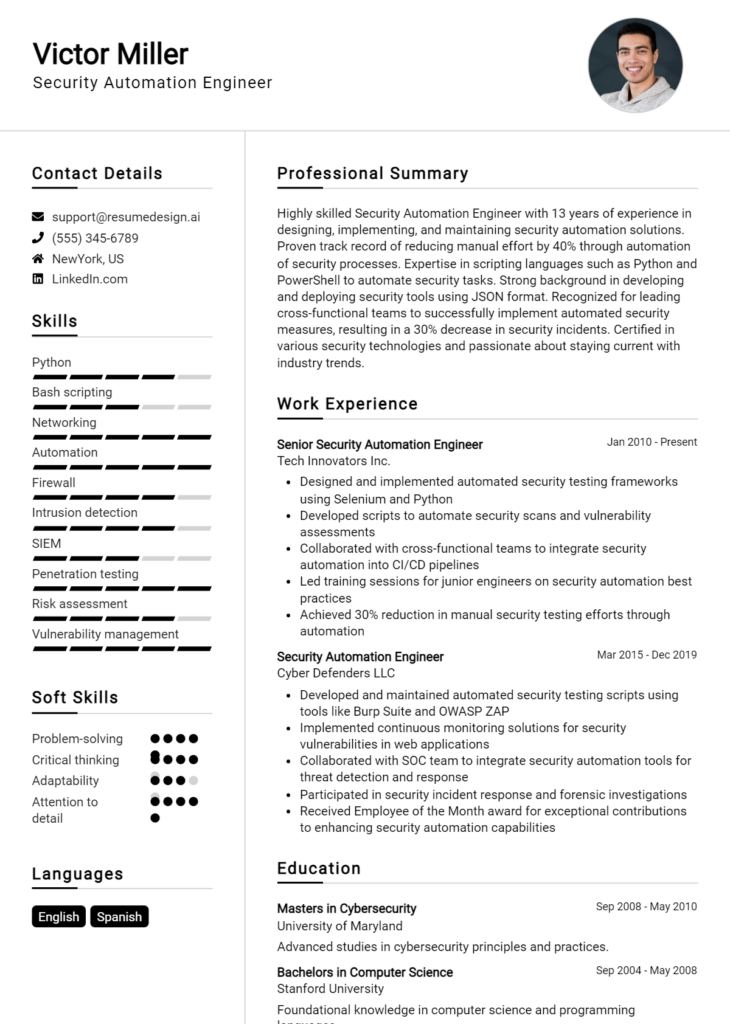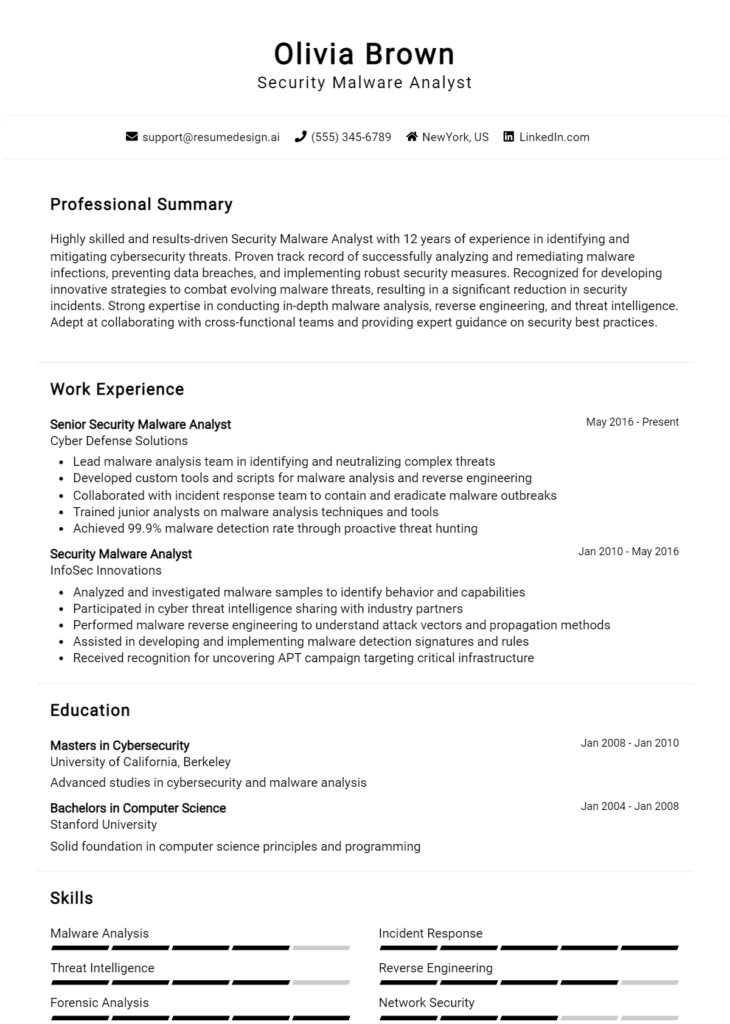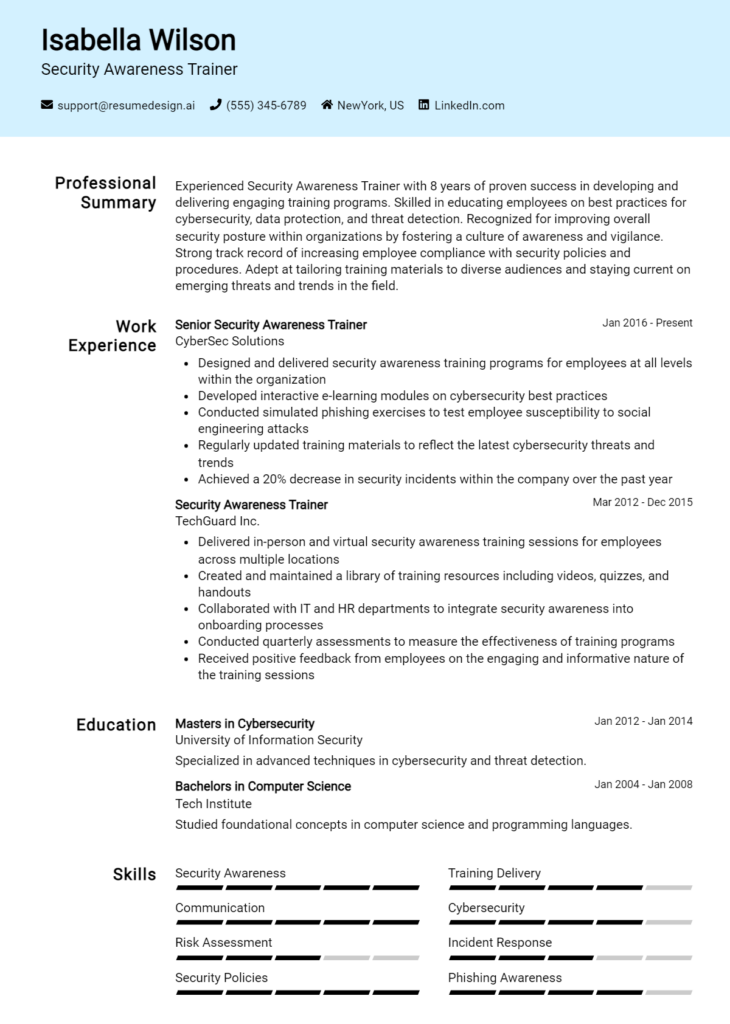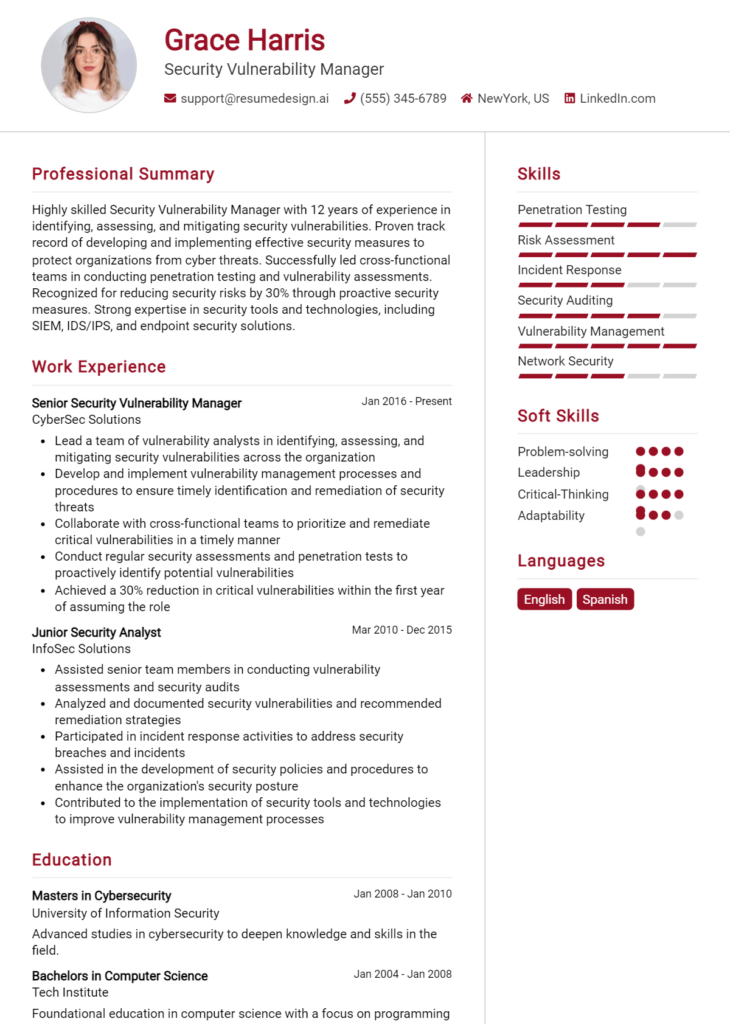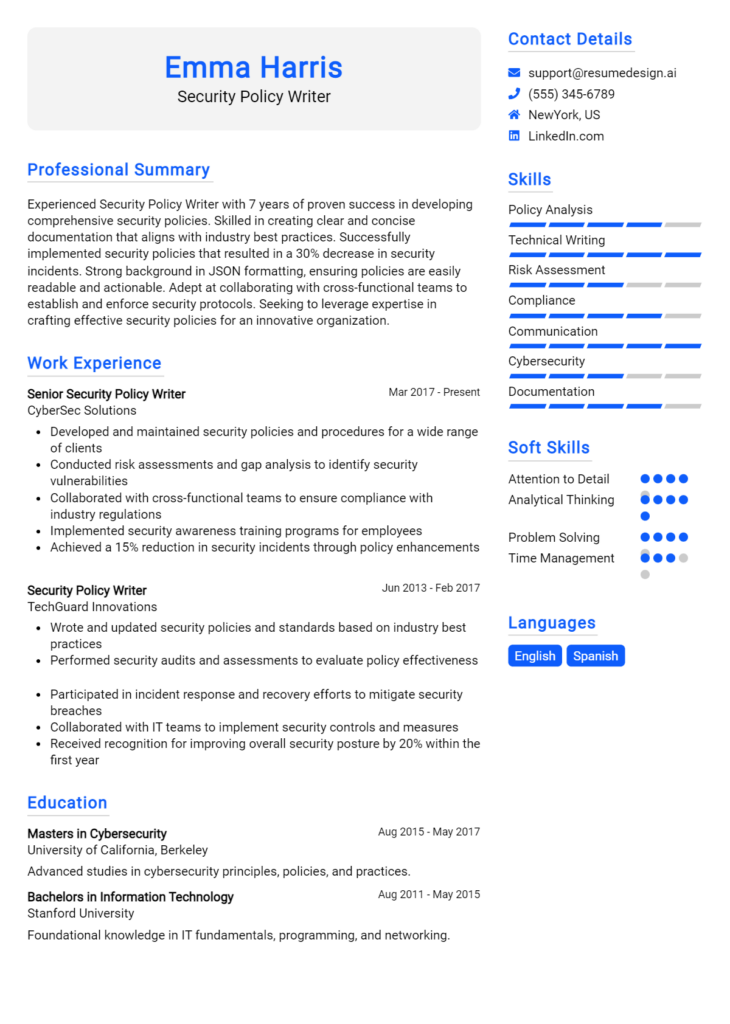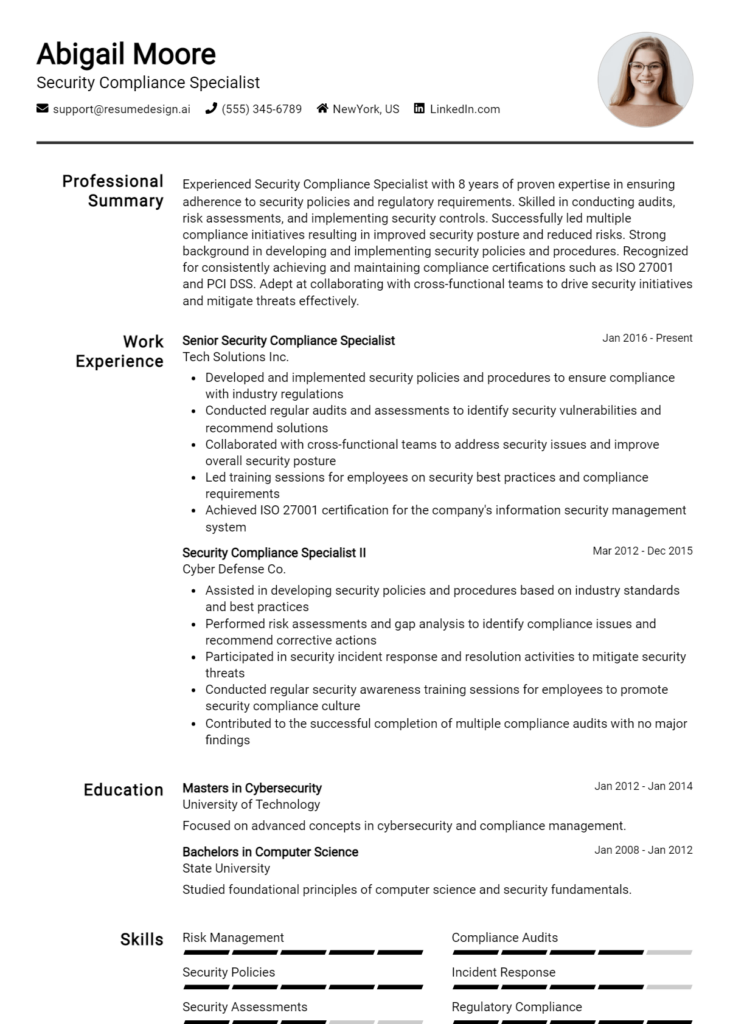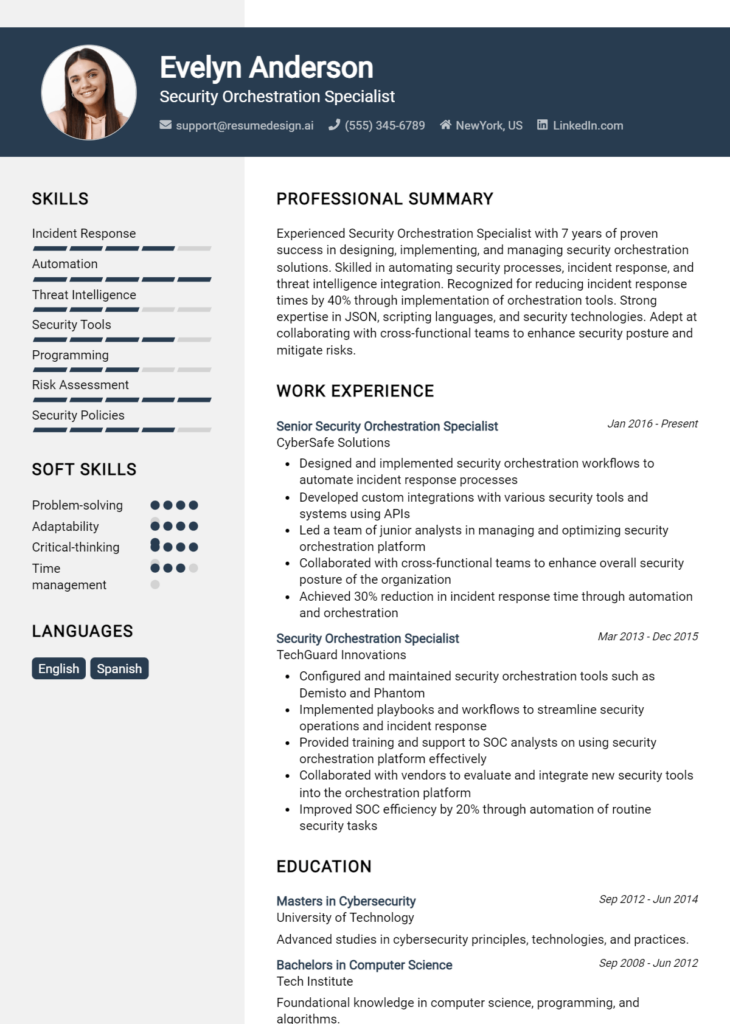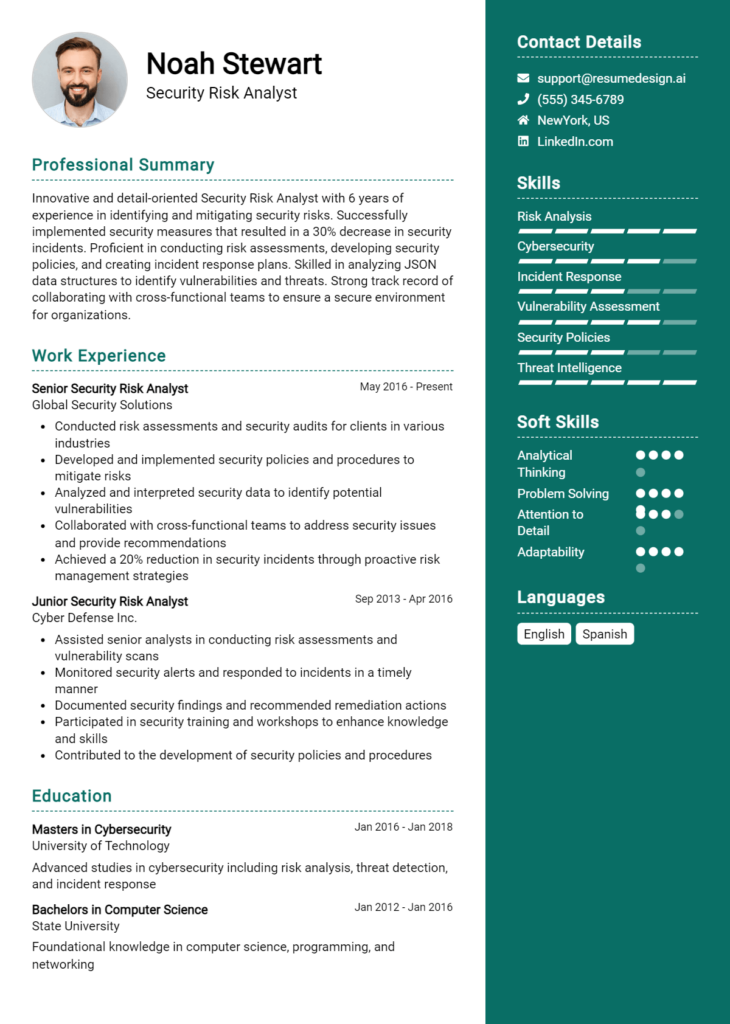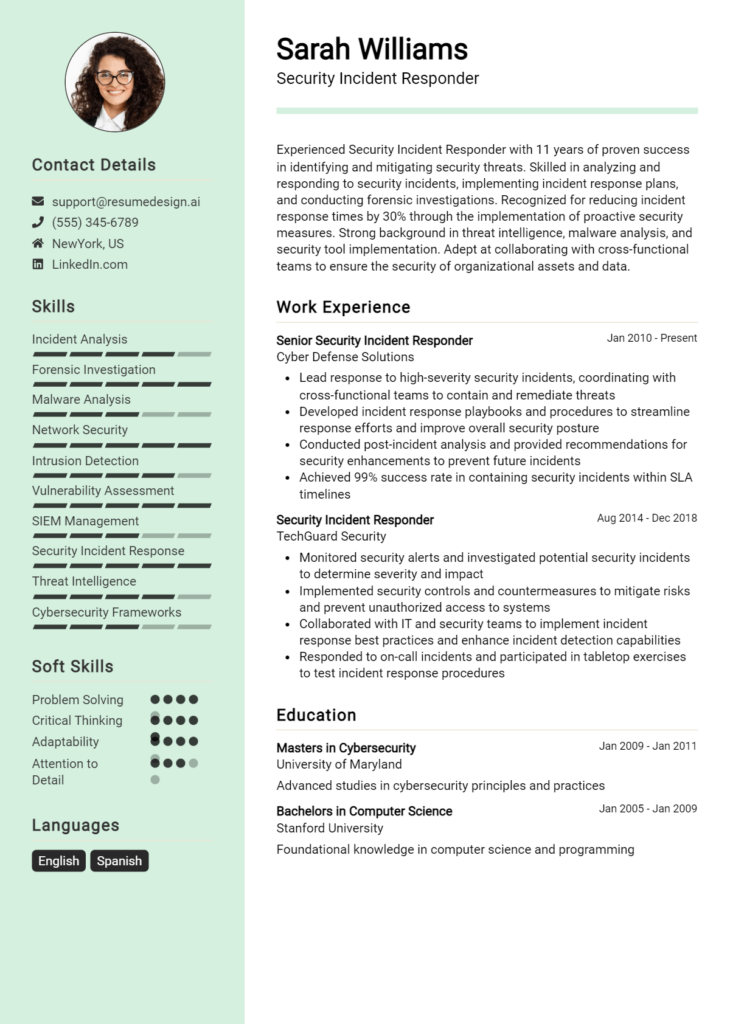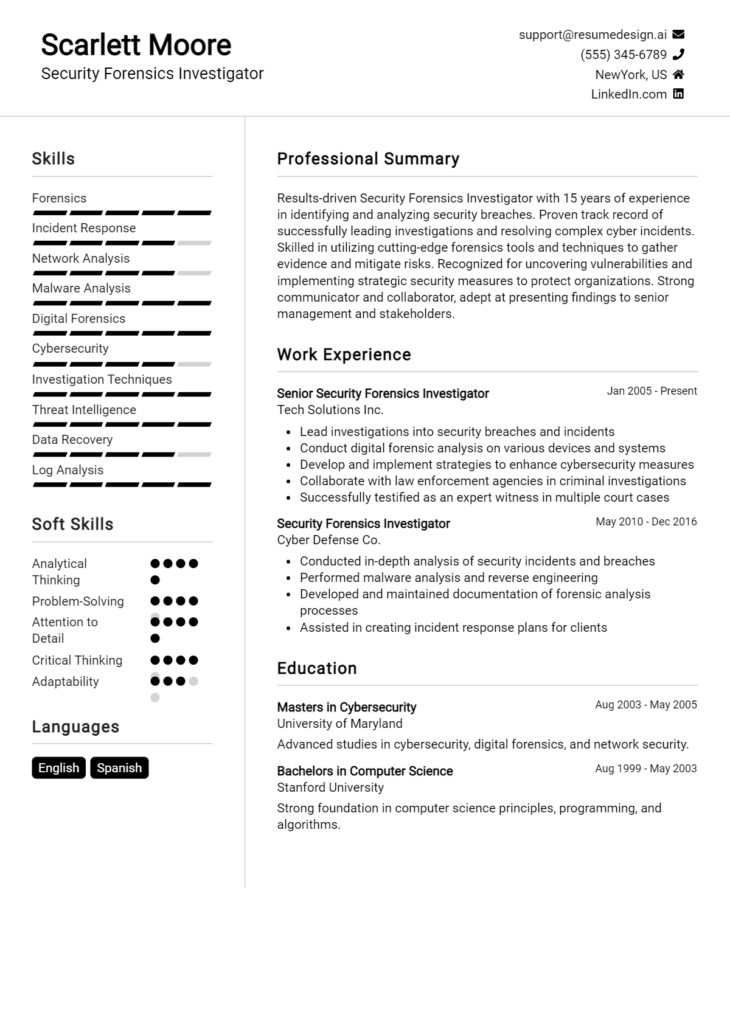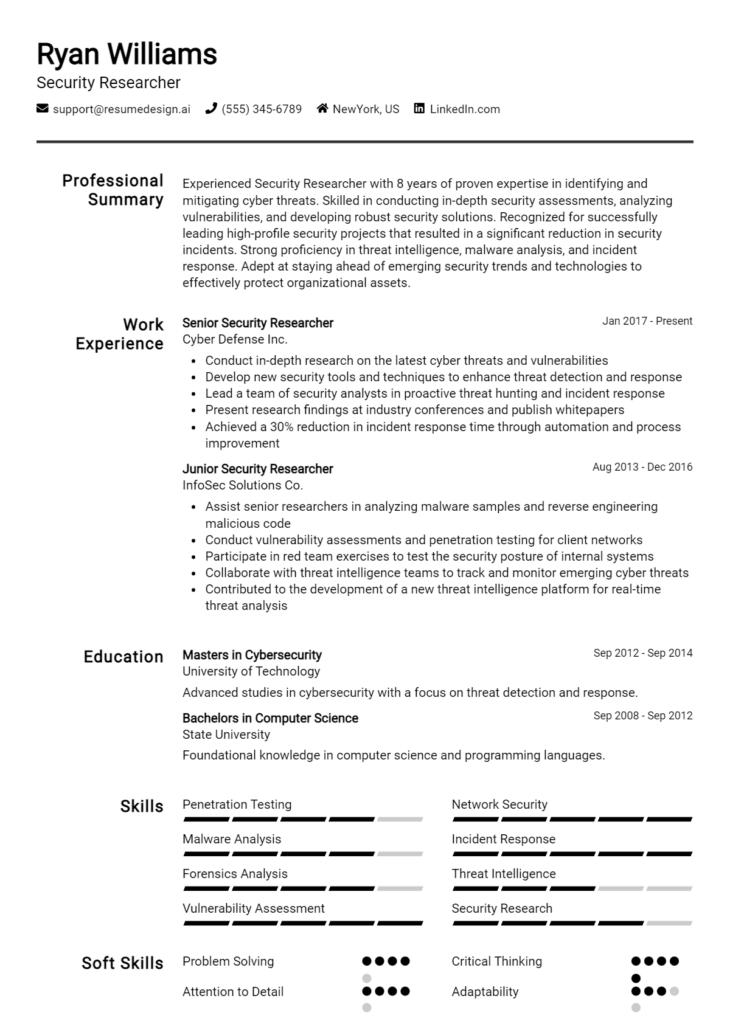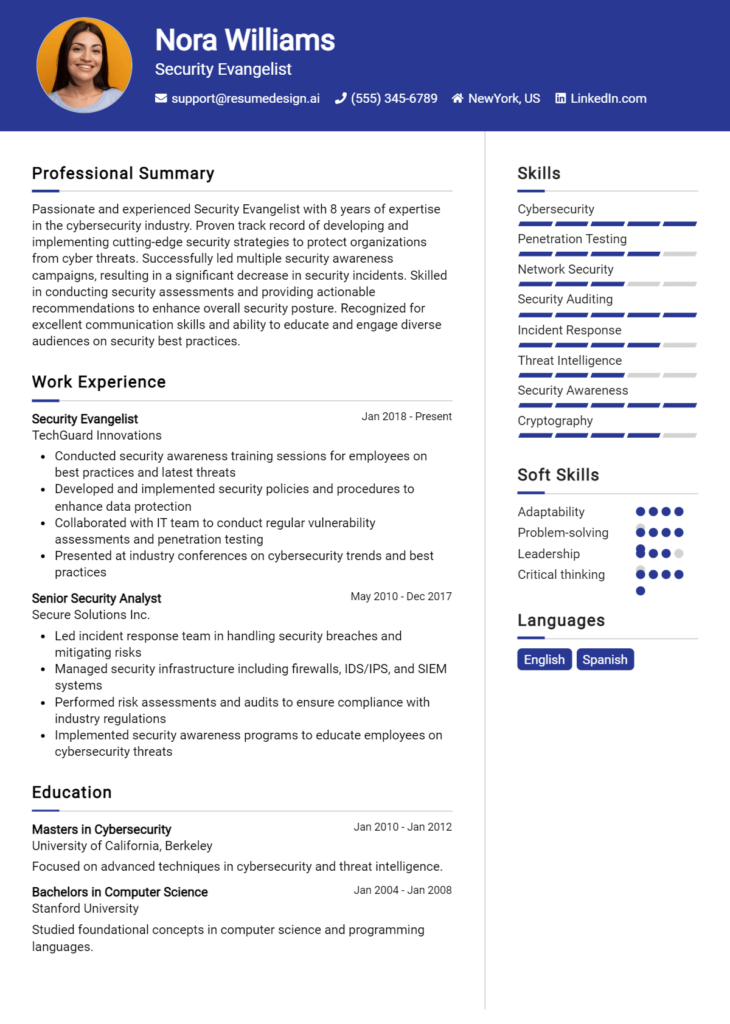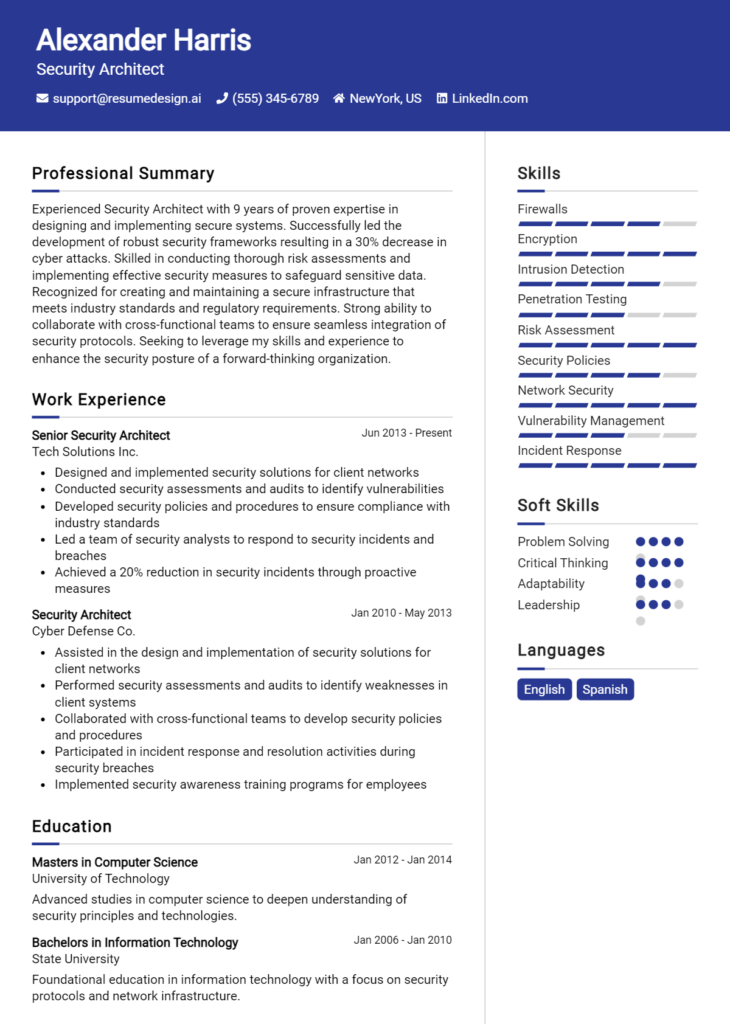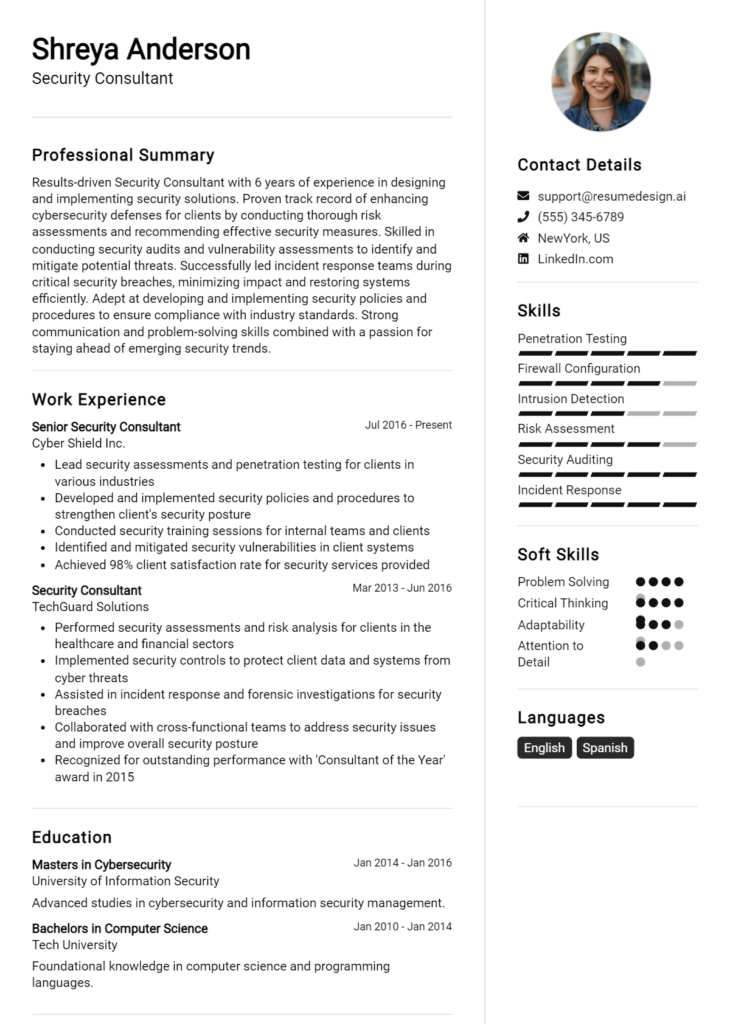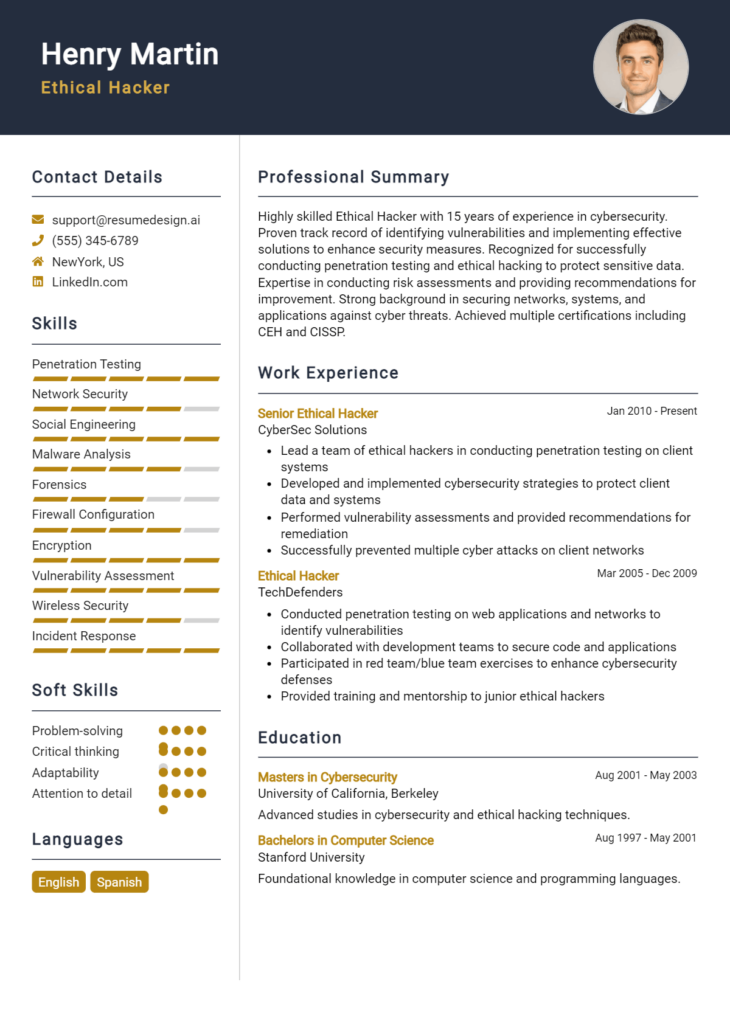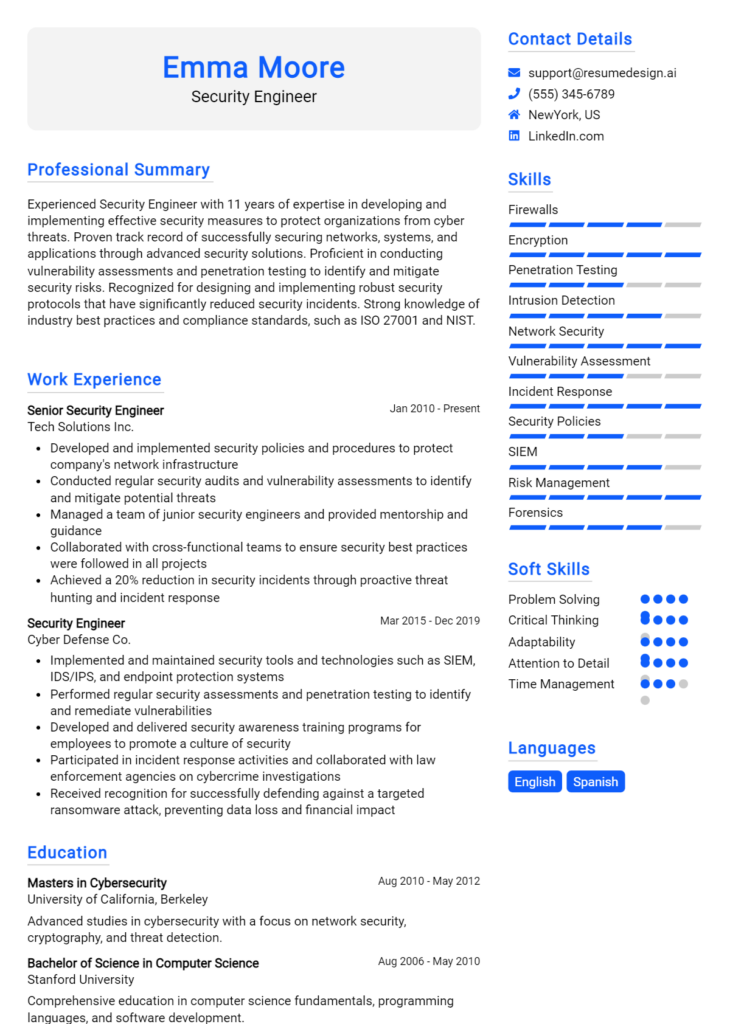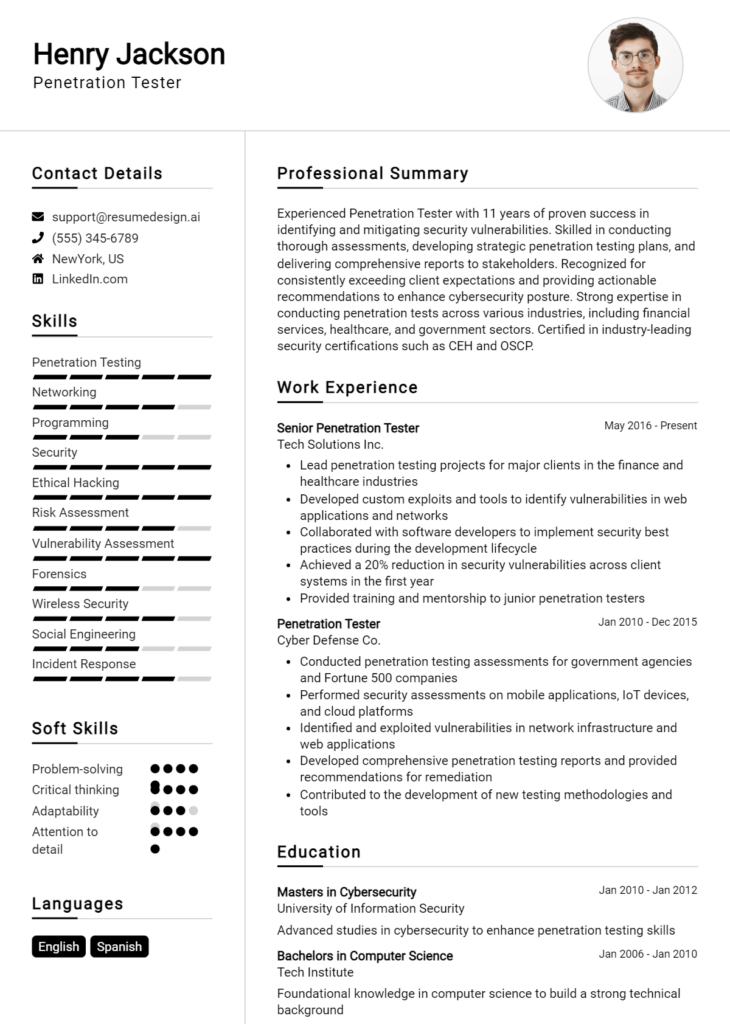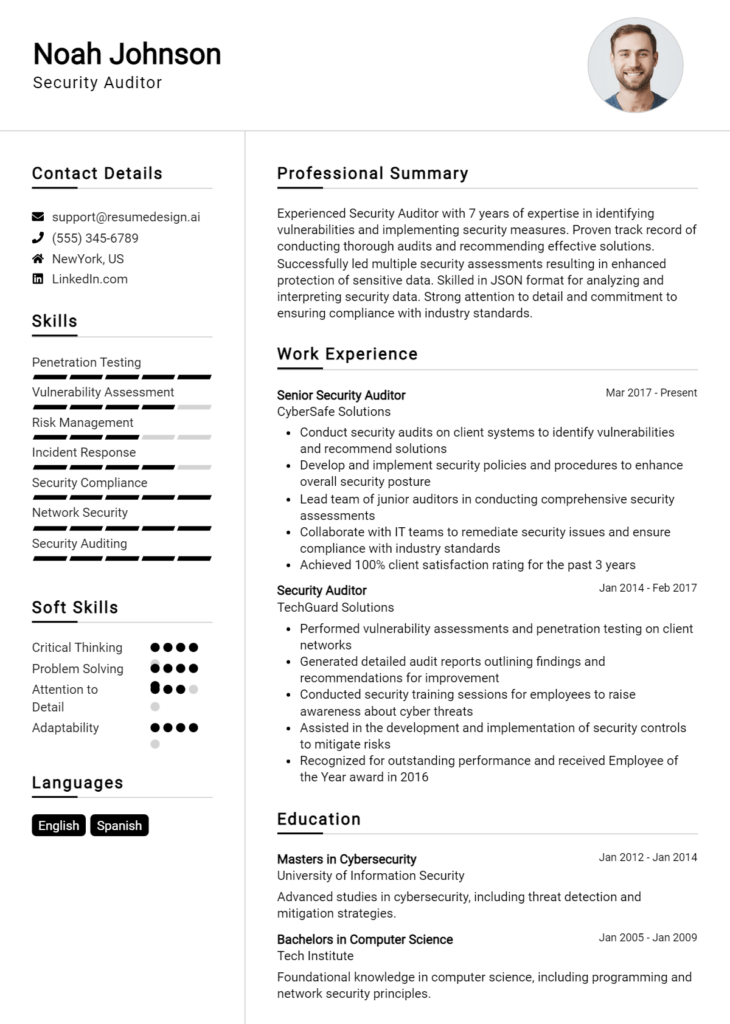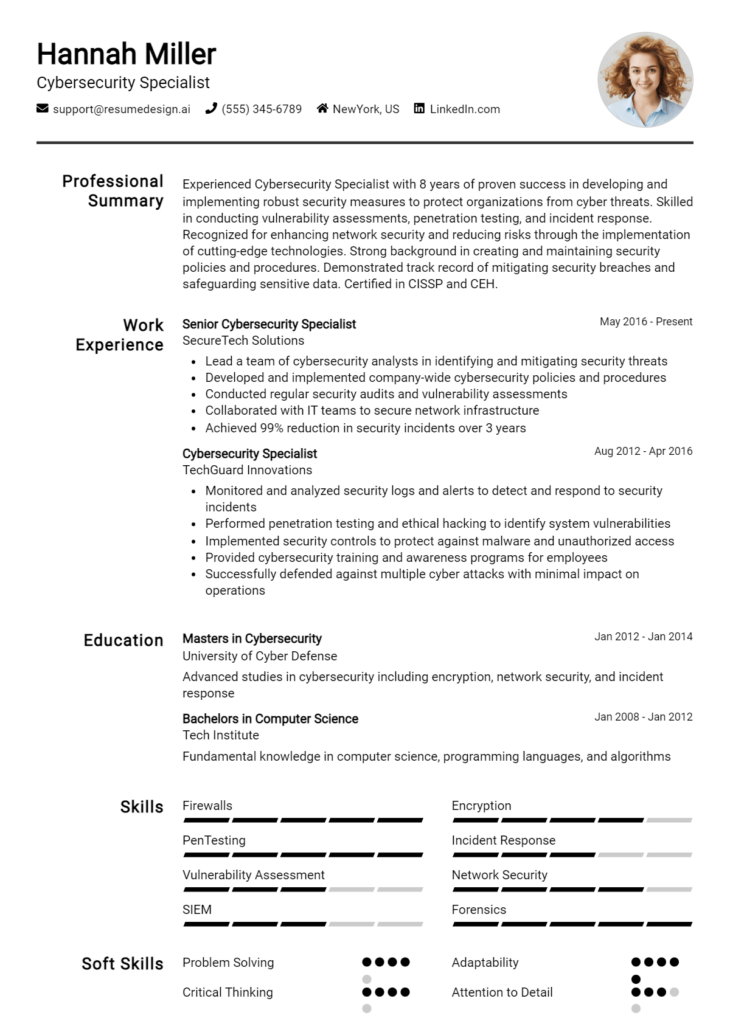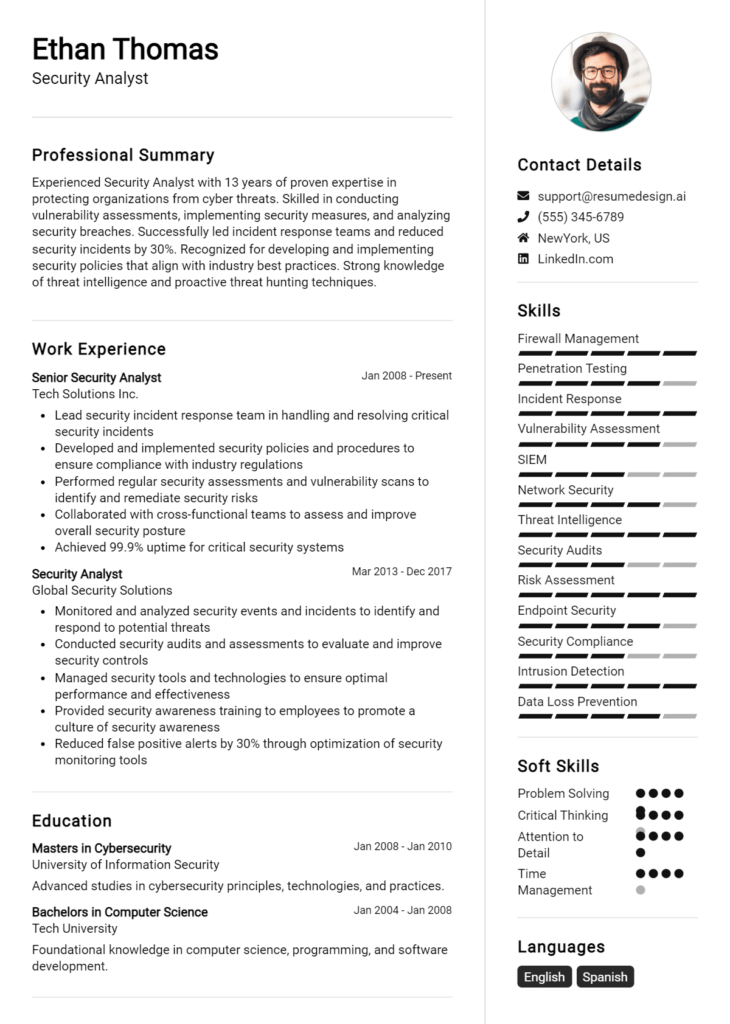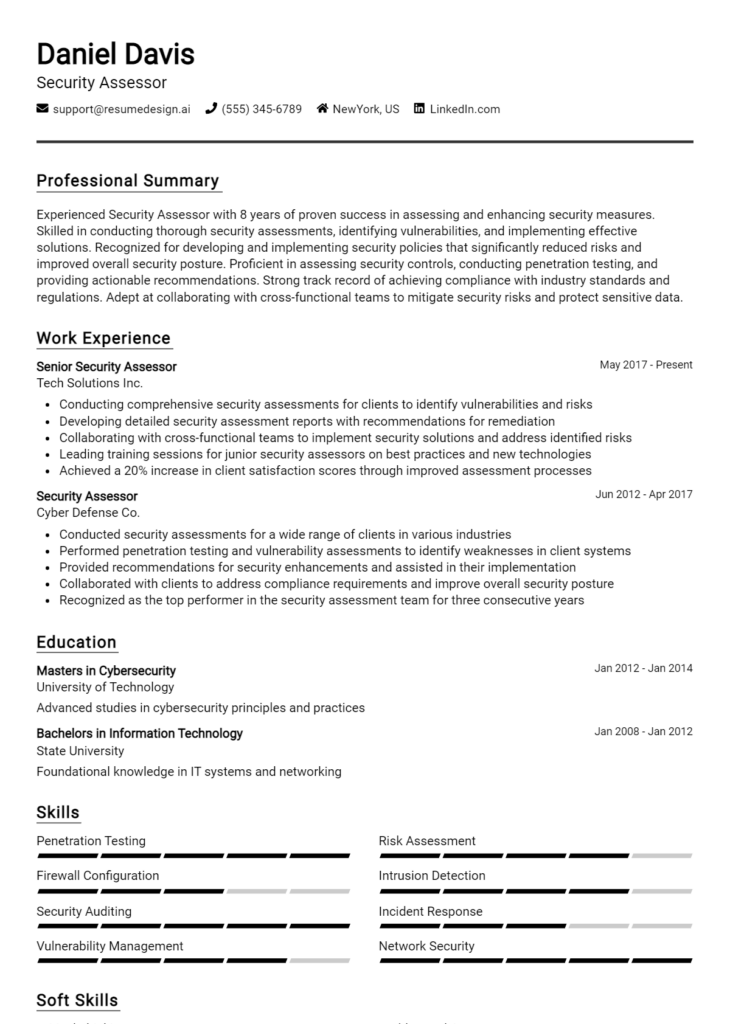Security Monitoring Specialist Core Responsibilities
A Security Monitoring Specialist is pivotal in safeguarding an organization's assets by continuously monitoring security systems and responding to incidents. They bridge various departments, collaborating with IT, operations, and compliance teams to ensure seamless security protocols. Key skills include technical proficiency in security software, operational insight for incident response, and problem-solving capabilities to analyze threats effectively. These competencies contribute to the organization's overall security goals. A well-structured resume highlighting these qualifications can significantly enhance career opportunities.
Common Responsibilities Listed on Security Monitoring Specialist Resume
- Monitor security systems and alarms for potential breaches.
- Analyze security incidents and provide detailed reports.
- Collaborate with IT departments to enhance cybersecurity measures.
- Conduct regular audits of security protocols and systems.
- Respond promptly to security alerts and incidents.
- Implement and update security monitoring tools and software.
- Educate staff on security policies and best practices.
- Participate in security training and development programs.
- Maintain documentation of monitoring activities and incidents.
- Assist in compliance audits and risk assessments.
- Provide recommendations for improving security measures.
- Stay updated on emerging security threats and technologies.
High-Level Resume Tips for Security Monitoring Specialist Professionals
In today's competitive job market, a well-crafted resume serves as a crucial tool for Security Monitoring Specialist professionals aiming to make a strong first impression on potential employers. Your resume is often the initial point of contact, and it must effectively communicate your skills, achievements, and industry knowledge. A tailored resume not only highlights your qualifications but also demonstrates your understanding of the specific requirements of the role. This guide will provide practical and actionable resume tips specifically designed for Security Monitoring Specialist professionals, helping you stand out in the hiring process.
Top Resume Tips for Security Monitoring Specialist Professionals
- Tailor your resume to the specific job description, emphasizing skills and experiences that align with the requirements outlined by the employer.
- Start with a strong summary statement that encapsulates your expertise in security monitoring and your career objectives.
- Showcase relevant experience, focusing on roles that involved security systems, incident response, and monitoring technologies.
- Quantify your achievements by including metrics, such as the percentage of incidents you successfully resolved or improvements in response times.
- Highlight industry-specific skills such as knowledge of security protocols, risk assessment, and familiarity with monitoring tools and software.
- Incorporate keywords from the job posting to enhance your chances of passing through applicant tracking systems (ATS).
- Include relevant certifications, such as Certified Information Systems Security Professional (CISSP) or Certified Information Security Manager (CISM), to validate your qualifications.
- Keep the format clean and professional, using bullet points for easy readability and ensuring consistent font and spacing.
- Proofread your resume carefully to eliminate any typos or grammatical errors that could undermine your professionalism.
By implementing these tips, you can significantly increase your chances of landing a job in the Security Monitoring Specialist field. A well-structured and tailored resume not only showcases your qualifications but also reflects your commitment to the profession, making you a more attractive candidate to potential employers.
Why Resume Headlines & Titles are Important for Security Monitoring Specialist
The role of a Security Monitoring Specialist is critical in safeguarding an organization’s digital assets and ensuring a robust defense against cybersecurity threats. In today's competitive job market, a standout resume headline or title is essential for catching the attention of hiring managers. A well-crafted headline acts as a succinct summary, encapsulating a candidate's key qualifications and setting the tone for the entire resume. It should be concise, relevant, and directly related to the job being applied for, allowing hiring managers to quickly assess whether the candidate possesses the necessary skills and experience for the role.
Best Practices for Crafting Resume Headlines for Security Monitoring Specialist
- Be concise: Aim for a headline that is no longer than 10-15 words.
- Be role-specific: Clearly indicate your specialization in security monitoring.
- Highlight key skills: Include relevant skills that are in demand for the role.
- Use action-oriented language: Employ strong verbs to convey your achievements.
- Incorporate industry keywords: Use terminology that aligns with the job description.
- Showcase relevant experience: Mention years of experience or notable accomplishments.
- Avoid jargon: Keep the language straightforward and easy to understand.
- Tailor for each application: Customize your headline to match the specific job you’re applying for.
Example Resume Headlines for Security Monitoring Specialist
Strong Resume Headlines
“Experienced Security Monitoring Specialist with 5+ Years in Threat Detection and Incident Response”
“Certified Cybersecurity Analyst Specializing in Real-Time Security Monitoring and Risk Assessment”
“Proven Expertise in Security Operations Center Management and Advanced Threat Analysis”
Weak Resume Headlines
“Security Expert”
“Looking for a Job in Security”
The strong headlines are effective because they provide specific information about the candidate's experience, qualifications, and areas of expertise, allowing hiring managers to quickly understand their suitability for the role. In contrast, the weak headlines fail to impress due to their vagueness and lack of detail, making it difficult for recruiters to gauge the candidate's skills or relevance to the position. A compelling headline should capture attention and invite further exploration of the resume, while weak headlines leave a lack of impact and clarity.
Writing an Exceptional Security Monitoring Specialist Resume Summary
A well-crafted resume summary is crucial for a Security Monitoring Specialist, as it serves as a powerful introduction that quickly captures the attention of hiring managers. This brief overview showcases key skills, relevant experience, and notable accomplishments, allowing candidates to make a strong first impression. A concise and impactful summary tailored to the specific job can effectively highlight a candidate's qualifications, making it easier for hiring managers to identify their potential fit within the organization.
Best Practices for Writing a Security Monitoring Specialist Resume Summary
- Quantify Achievements: Use specific numbers or outcomes to demonstrate your successes, such as the percentage of security breaches reduced or the number of incidents managed.
- Focus on Key Skills: Highlight skills that are directly relevant to the job description, such as threat detection, incident response, or knowledge of security tools.
- Tailor the Summary: Customize your summary for each job application, ensuring it aligns with the company’s needs and values.
- Use Action Verbs: Start sentences with strong action verbs to convey your contributions and achievements more dynamically.
- Keep it Concise: Aim for 2-4 sentences that deliver impactful information without overwhelming the reader.
- Showcase Certifications: Mention any relevant certifications or training that set you apart, such as CISSP or CISM.
- Highlight Collaboration: If applicable, emphasize your ability to work with cross-functional teams, as collaboration is often essential in security roles.
- Include Soft Skills: Don’t forget to mention important soft skills like analytical thinking, attention to detail, and communication abilities.
Example Security Monitoring Specialist Resume Summaries
Strong Resume Summaries
Results-driven Security Monitoring Specialist with over 5 years of experience in threat detection and incident response, successfully reducing security breaches by 40% through proactive monitoring and analysis of security systems.
Detail-oriented professional with expertise in SIEM tools and vulnerability assessments, having led a team that identified and mitigated over 200 potential security threats, enhancing the organization’s security posture significantly.
Certified Information Systems Security Professional (CISSP) with a proven track record of implementing robust security measures, achieving a 98% success rate in incident prevention over the past three years.
Weak Resume Summaries
Experienced security professional looking for a new opportunity in security monitoring.
I have worked in various security roles and have some knowledge of monitoring systems.
The strong examples are considered effective because they provide specific, quantifiable results and relevant skills directly related to the Security Monitoring Specialist role. They demonstrate the candidate's impact and expertise in the field. Conversely, the weak summaries lack detail, specificity, and measurable outcomes, making them generic and less engaging to potential employers.
Work Experience Section for Security Monitoring Specialist Resume
The work experience section of a Security Monitoring Specialist resume is vital in demonstrating the candidate's technical prowess and capacity to lead teams while delivering high-quality products. This section allows candidates to showcase their relevant experiences, emphasizing their ability to manage security operations, implement monitoring solutions, and respond to incidents effectively. By quantifying achievements, such as the reduction of security breaches or the enhancement of monitoring efficiency, candidates can provide concrete evidence of their contributions. Aligning experiences with industry standards also ensures that potential employers recognize the candidate's qualifications and suitability for the role.
Best Practices for Security Monitoring Specialist Work Experience
- Highlight relevant technical skills, such as proficiency in security monitoring tools and incident response protocols.
- Quantify results by including metrics, such as percentage reductions in security incidents or time saved through process improvements.
- Emphasize leadership roles in team projects, showcasing the ability to manage and motivate teams effectively.
- Detail collaboration with cross-functional teams, demonstrating a holistic approach to security management.
- Use industry-specific language to align experiences with employer expectations and standards.
- Focus on continuous improvement initiatives, illustrating a commitment to enhancing security practices.
- Incorporate certifications or training relevant to the role to bolster credibility.
- Provide context for each role by explaining the organization's mission and the impact of your contributions.
Example Work Experiences for Security Monitoring Specialist
Strong Experiences
- Led a team of 5 security analysts to implement a new monitoring system, resulting in a 40% reduction in incident response time over six months.
- Developed and executed a security awareness training program that decreased phishing incident reports by 30% within the first quarter.
- Collaborated with the IT department to enhance network security protocols, improving overall system security ratings by 25% as per industry benchmarks.
- Managed a security operations center (SOC) that monitored over 10,000 endpoints, achieving 99% uptime and a 50% reduction in false positives through optimized alert settings.
Weak Experiences
- Worked in a security team to monitor systems.
- Involved in various projects related to security.
- Assisted with incident response tasks when needed.
- Participated in meetings to discuss security issues.
The examples provided are considered strong because they highlight specific achievements and quantifiable outcomes, demonstrating the candidate's impact on the organization. They also illustrate technical leadership and collaboration, which are critical in the role of a Security Monitoring Specialist. In contrast, the weak experiences lack detail and concrete metrics, making them less compelling and failing to convey the candidate's true capabilities and contributions to potential employers.
Education and Certifications Section for Security Monitoring Specialist Resume
The education and certifications section of a Security Monitoring Specialist resume plays a crucial role in showcasing a candidate's academic accomplishments and industry-specific qualifications. This section not only highlights the foundational knowledge acquired through formal education but also emphasizes the commitment to professional development through relevant certifications and ongoing learning. By providing details such as relevant coursework, specialized training, and recognized certifications, candidates can significantly enhance their credibility and demonstrate their alignment with the requirements of the job role, making them more appealing to potential employers.
Best Practices for Security Monitoring Specialist Education and Certifications
- Prioritize industry-recognized certifications relevant to security monitoring, such as CompTIA Security+, Certified Information Systems Security Professional (CISSP), or Certified Information Security Manager (CISM).
- Include degrees in fields related to information technology, cybersecurity, or computer science, ensuring they are from accredited institutions.
- Highlight specific coursework that pertains to security monitoring, incident response, or risk management.
- List ongoing education or training programs that demonstrate a commitment to staying updated with industry trends and technologies.
- Be specific about certification dates, ensuring they are current and relevant to the role.
- Use clear formatting to differentiate between degrees, certifications, and coursework for easy readability.
- Consider including memberships in professional organizations, which can further validate expertise in the field.
- Avoid listing certifications or courses that are outdated or not recognized within the cybersecurity industry.
Example Education and Certifications for Security Monitoring Specialist
Strong Examples
- Bachelor of Science in Cybersecurity, University of Technology, 2020
- CompTIA Security+ Certification, Issued January 2023
- Certified Information Systems Security Professional (CISSP), Issued March 2022
- Coursework in Network Security and Incident Response, Completed August 2021
Weak Examples
- Associate Degree in General Studies, Community College, 2015
- Old CompTIA A+ Certification, Issued 2018
- Certification in Microsoft Office Suite, Completed 2019
- High School Diploma, Graduated 2010
The examples listed as strong are considered relevant because they directly align with the qualifications needed for a Security Monitoring Specialist, showcasing both technical knowledge and industry-recognized credentials. In contrast, the weak examples reflect outdated or irrelevant education and certifications that do not support the candidate's suitability for the role, thereby diminishing their overall appeal to potential employers.
Top Skills & Keywords for Security Monitoring Specialist Resume
In the rapidly evolving field of cybersecurity, a Security Monitoring Specialist plays a pivotal role in safeguarding an organization's digital assets. A well-crafted resume that highlights relevant skills is essential for standing out in a competitive job market. The skills section not only showcases your technical abilities but also reflects your problem-solving capabilities, attention to detail, and communication prowess. Employers seek candidates who possess a balanced mix of hard and soft skills, as these competencies are vital for effectively monitoring, detecting, and responding to security threats. By emphasizing the right skills in your resume, you demonstrate your readiness to contribute to the security posture of any organization.
Top Hard & Soft Skills for Security Monitoring Specialist
Soft Skills
- Analytical Thinking
- Attention to Detail
- Problem-Solving
- Communication Skills
- Team Collaboration
- Adaptability
- Time Management
- Critical Thinking
- Decision Making
- Stress Management
Hard Skills
- Intrusion Detection Systems (IDS)
- Security Information and Event Management (SIEM)
- Network Security Protocols
- Firewall Management
- Vulnerability Assessment
- Incident Response
- Malware Analysis
- Threat Intelligence
- Risk Management Frameworks
- Cloud Security Practices
By integrating a comprehensive list of skills into your resume, you can effectively convey your qualifications to potential employers. Additionally, highlighting relevant work experience will further strengthen your application, showcasing how you have applied these skills in real-world scenarios.
Stand Out with a Winning Security Monitoring Specialist Cover Letter
I am writing to express my interest in the Security Monitoring Specialist position at [Company Name], as advertised on [Where You Found the Job Posting]. With a robust background in security operations and a proven track record in threat detection and incident response, I am excited about the opportunity to contribute to your team and enhance your organization's security posture. My experience in leveraging advanced monitoring tools and techniques has equipped me with the necessary skills to identify potential vulnerabilities and respond to security incidents effectively.
In my previous role at [Previous Company Name], I was responsible for monitoring network activity and analyzing security alerts to safeguard sensitive information. I successfully implemented a proactive monitoring strategy that reduced incident response times by 30%. My expertise in utilizing SIEM tools, along with my strong analytical skills, allowed me to detect anomalies and respond swiftly to potential threats. I am well-versed in creating detailed reports and collaborating with cross-functional teams to ensure a comprehensive approach to security.
I am particularly drawn to [Company Name] because of your commitment to innovation and excellence in cybersecurity. I am eager to bring my skills in threat analysis, risk assessment, and incident management to your organization. I believe that my ability to work under pressure, coupled with my attention to detail, makes me a strong candidate for this role. I am excited about the opportunity to contribute to your mission of safeguarding critical assets and ensuring a secure environment for your clients and employees.
Thank you for considering my application. I look forward to the possibility of discussing my qualifications further and exploring how I can add value to your security team. Please feel free to contact me at [Your Phone Number] or [Your Email Address] to arrange a convenient time for a conversation.
Common Mistakes to Avoid in a Security Monitoring Specialist Resume
When crafting a resume for the role of a Security Monitoring Specialist, it's essential to present qualifications and experiences in a clear and compelling manner. However, many candidates fall into common pitfalls that can undermine their chances of landing an interview. Understanding these mistakes can help you create a stronger resume that effectively showcases your skills and expertise in the field of security monitoring.
Lack of Specificity: Using vague language and general descriptions can make it difficult for hiring managers to gauge your expertise. Be specific about tools used, incidents managed, and outcomes achieved.
Ignoring Keywords: Failing to incorporate relevant keywords from the job description can result in your resume being filtered out by Applicant Tracking Systems (ATS). Tailor your resume to reflect the language used in the job listing.
Overloading with Technical Jargon: While it's important to demonstrate technical proficiency, overwhelming the reader with jargon can alienate hiring managers who may not be experts in security technologies. Balance technical terms with clear explanations.
Neglecting Achievements: Simply listing job responsibilities without highlighting accomplishments can weaken your resume. Quantify your achievements with metrics, such as reduced response times or improved incident resolution rates.
Poor Formatting: A cluttered or overly complicated layout can make your resume difficult to read. Use clear headings, bullet points, and consistent formatting to enhance readability and organization.
One-Size-Fits-All Approach: Sending out the same resume for different positions can diminish your chances. Customize your resume for each application to align your experiences with the specific requirements of the role.
Omitting Soft Skills: While technical skills are crucial, soft skills like communication, teamwork, and problem-solving are equally important in a Security Monitoring Specialist role. Highlight these competencies to demonstrate your well-roundedness.
Ignoring Professional Development: Not mentioning relevant certifications, training, or continuous education can make your resume less competitive. Showcase your commitment to staying current in the field with ongoing professional development efforts.
Conclusion
As a Security Monitoring Specialist, you play a crucial role in safeguarding an organization’s information systems by actively monitoring, analyzing, and responding to security incidents. The key responsibilities include utilizing advanced monitoring tools, identifying vulnerabilities, maintaining compliance with security policies, and collaborating with other IT teams to strengthen overall security posture.
In addition to technical skills, effective communication and analytical abilities are essential for success in this role. Staying current with industry trends and threats is also vital to ensure that security measures are proactive rather than reactive.
To enhance your chances of landing a position as a Security Monitoring Specialist, it's important to have a well-crafted resume that highlights your relevant skills, experiences, and certifications. We encourage you to take a moment to review your resume and ensure it reflects your qualifications accurately.
For your convenience, there are various resources available to assist you in this process. You can explore resume templates to find a design that suits your style, utilize the resume builder for a step-by-step creation process, and check out resume examples for inspiration. Additionally, don’t forget to prepare a compelling cover letter using our cover letter templates to make a strong impression.
Take action today and elevate your resume to match your expertise and ambitions as a Security Monitoring Specialist!

